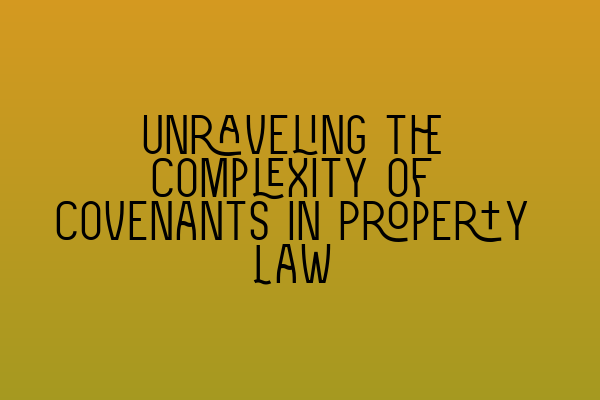Unraveling the Complexity of Covenants in Property Law
At SQE Property Law & Land Law, we understand that navigating the intricacies of property law can be a daunting task. One particular area that often causes confusion is covenants. Covenants are legal obligations or restrictions that are attached to a property and bind the current and future owners of that property. They can have a significant impact on property transactions and the rights and obligations of property owners.
To help you better understand the complexity of covenants in property law, we have prepared this detailed blog post. We will break down the key concepts and provide you with the knowledge you need to navigate this area of law with confidence.
1. Understanding the Types of Covenants
Covenants can be classified into several different categories, each with its own set of rules and implications. Some common types of covenants include:
a) Restrictive Covenants: These covenants impose restrictions on how a property can be used or developed. They are often found in residential areas to protect the character of the neighborhood or to maintain specific standards. Restrictive covenants can cover matters such as building height restrictions, use restrictions, or even the colors allowed for external painting.
b) Positive Covenants: Positive covenants require the property owner to perform specific actions or comply with certain obligations. For example, a positive covenant might require the property owner to contribute to the maintenance of shared facilities, such as roads or drainage systems.
c) Freehold Covenants: Freehold covenants are covenants that bind both the current and future owners of the property. They are typically created when a property is sold subject to certain obligations that run with the land. Freehold covenants can have a long-lasting impact and can be legally enforceable.
d) Leasehold Covenants: Leasehold covenants arise in the context of leasehold properties. These covenants are agreements between the landlord and tenant and typically govern matters such as rent payment, repair obligations, or permitted use of the property.
2. Creation and Enforceability of Covenants
Covenants can be created in various ways, including through deeds, planning permissions, or even by implication. The creation and enforceability of covenants can depend on a multitude of factors, such as the intention of the parties, the wording of the covenant, and the applicable law.
The enforcement of covenants can be complex and often requires legal expertise. In some cases, enforcement may involve seeking an injunction to prevent a breach, seeking damages for a breach that has already occurred, or negotiating a release or variation of the covenant.
3. Overcoming the Limitations of Covenants
It is important to note that certain covenants may have limitations, and there are legal mechanisms to overcome or modify these limitations. For example, it may be possible to apply to the Upper Tribunal (Lands Chamber) for a modification or discharge of a restrictive covenant if certain conditions are met. Seeking professional legal advice can help you explore your options and navigate the legal process effectively.
4. Seeking Professional Advice
Given the complexity of covenants in property law, it is advisable to seek professional advice when dealing with a property that is subject to covenants or when considering the creation of covenants. A solicitor with expertise in property law can provide invaluable guidance and ensure that your rights and obligations are protected.
At SQE Property Law & Land Law, our team of experienced solicitors can assist you with all aspects of property law, including the interpretation, creation, and enforcement of covenants. With our in-depth knowledge and expertise, we can guide you through the complexities of this area of law and help you achieve your desired outcomes.
If you are preparing for the SQE 1 or SQE 2 exams which cover property law, we also offer comprehensive preparation courses and practice exams. You can visit our website to access SQE 1 practice exam questions and SQE 1 practice mocks FLK1 FLK2. We also provide SQE 2 preparation courses to help you excel in your property law studies.
To stay up to date with the latest SRA SQE exam dates and other important information related to the SQE, we recommend visiting our website regularly.
In conclusion, covenants in property law can be complex, but with the right understanding and guidance, you can navigate this area of law effectively. Whether you need assistance with the creation, interpretation, or enforcement of covenants, our team at SQE Property Law & Land Law is here to help. Contact us today to speak with one of our expert solicitors and ensure that you are on the right path to success in your property law matters.
